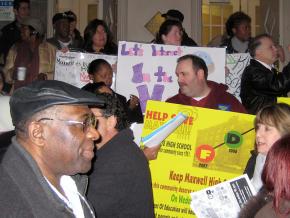NYC school closings halted
New York City teacher reports on a judge's decision to halt school closings--and what it means for teachers, parents and students fighting for their schools.
SPRING RECESS didn't begin well for New York City Mayor Michael Bloomberg and schools Chancellor Joel Klein. Their plans to close or "phase out" 19 schools were halted by a state judge who, in a rare turn of events, sided with the United Federation of Teachers (UFT) and the NAACP in declaring the closings "null and void."
The March 26 decision was a major blow to Bloomberg and Klein, who aren't used to being told "no." It exposed the city Department of Education's sham proceedings that led up to the Panel for Educational Policy's predictable "rubber stamping" of their decision two months ago, earning the ire of thousands of teachers, students and parents.
The ruling was also a testament to the power of the protest movement that erupted in response to the proposed closings.
Hundreds of teachers, parents and students organized demonstrations at individual schools and participated in a citywide rally at Bloomberg's house on January 21 in a groundswell of grassroots activism. The battle culminated in a fiery protest at the January 26 meeting of the Panel for Educational Policy, where speaker after speaker denounced Klein and the puppets on his panel, delaying a vote on the closings until the early morning hours.

This vibrant movement of teachers, students and parents turned the tide against Bloomberg and Klein's vociferous and destructive brand of school "reform"--that's the real reason for the recent victory in the courts.
The victory is, however, a limited one. The lawsuit filed by the UFT and NAACP was argued primarily on procedural grounds, charging that the Department of Education (DOE) violated state education law based on the process used to determine which schools would close. As a result, the DOE must now start the process over again, with more community input and greater transparency in its decision-making process.
On its own, the ruling simply delays school closings, rather than stopping them. In response, the DOE quickly appealed the decision. Initially, the DOE refused to even comply with the judge's orders and refused to redo the high school application process. The effect of this would be to create "facts on the ground"--by simply failing to send students to the schools in question.
Under pressure, Klein backed down from this contemptuous attitude toward the judge and the more than 8,000 students who had applied to one of these schools. Nonetheless, it's clear that Bloomberg and Klein are treating the court ruling as a minor obstacle in their path, and they are intent on bulldozing their way through.
THE UFT should be only too aware of the limits of legal victories when there is no means to implement them. The Campaign for Fiscal Equity (CFE)--a decade-long court battle against New York state for the systematic underfunding of New York City's schools--is a case in point.
The CFE rightly argued that the state's shortchanging of city schools was a civil rights violation and a breach of the state's constitutional commitment to provide a "sound, basic education" to all students.
In 2001, state Supreme Court Justice Leland de Grasse ruled against the government--and former Gov. George Pataki's notable appeal based on the argument that graduating from eighth grade constituted a "sound, basic education." De Grasse ordered billions of dollars in additional funding to be sent to New York City.
Still, not a penny of that money trickled down to New York City's schools--the legislature and the governor simply refused to comply. After many appeals, the original amount of over $5 billion a year in aid and an additional $9.2 billion in capital funds was whittled down to a quarter of the original amount.
This paltry sum was supposed to be used to reduce class sizes in the city. Four years of budget cuts later, the CFE money is nothing but a dim memory, our schools are still underfunded, and the average class size has increased. The UFT's next step? They're headed back to court for another round.
The Campaign for Fiscal Equity debacle should serve as an object lesson that history isn't made in the courts alone, nor has the justice system ever ensured equal access to a quality public education.
However, this recent legal victory against the 19 closures does have the potential to revitalize the movement against school closings--and challenge the education deformers who set up schools to fail, and then punish them when they do. To turn this temporary reprieve into a permanent victory, the UFT must take advantage of the opening to mobilize teachers and community allies to build a citywide movement against school closings that can harness the full power of our union in defense of our schools.
Without a real fight, school closings are not going away. The 19 schools on the city's hit list this year are just one round in an escalating war on our schools. Already, the state of New York has put another 34 schools in New York City on a list of "failing" schools subject to closure or other draconian brands of "restructuring"--all as part of pursuing the federal government's "Race to the Top" funds, which have schools nationally racing to the bottom.
Now is the time to build on the recent legal victory and mobilize rank-and-file teachers, in alliance with parents and students, to stop the attacks on our schools and demand equal quality public education for all.


